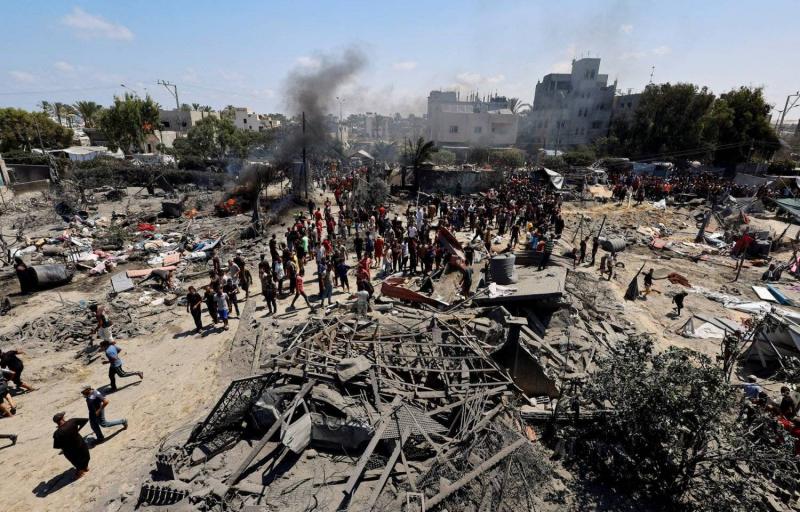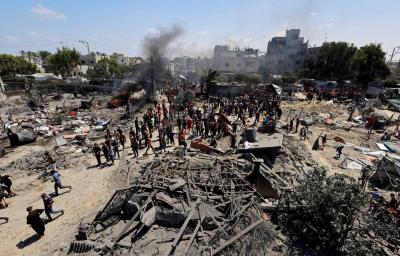The attempted assassination of Mohammed Deif, the commander of the "Izz ad-Din al-Qassam Brigades" in the Gaza Strip, after more than three decades of complex pursuit—an attempt whose results are still undetermined—has highlighted a long series of assassinations carried out by Israel both inside and outside Palestinian territories. This list has so far included numerous Palestinian leaders from various factions, along with figures from different nationalities. For decades, when the bases of the Palestinian revolution were located abroad, the Israeli external intelligence agency, "Mossad," was able to assassinate many Palestinian leaders in various capitals. Since the establishment of the Palestinian Authority in the early 1990s, the Israeli internal security service, "Shabak," succeeded in assassinating another long list of Palestinian leaders in the West Bank and Gaza Strip, in what appeared to be a one-sided war favoring Israel.
Israel's success in reaching Hamas and al-Qassam leaders in Gaza, after nine months of the current war, remains a topic of debate. Some see that the inability to target significant figures from Hamas after nine months suggests failures, as it has not yet been confirmed that Israel successfully assassinated Deif, and it has yet to reach Hamas leader in Gaza Yehya Sinwar or his brother Mohammed. However, others believe that the possible assassination of Deif, his deputy Marwan Issa, and other brigade leaders in al-Qassam could represent a significant achievement for Israel.
A few days ago, Israel carried out a massive operation targeting Deif, whom it had been pursuing for over 30 years, in a complex operation driven by what the Israelis describe as "golden" intelligence concerning his whereabouts near Khan Younis in southern Gaza. Previously, they killed his deputy Marwan Issa, as well as the commander of the Khan Younis Brigade in al-Qassam, Raef Salama (in the same strike targeting Deif), and other leaders like Ayman Nofal, Ahmad Al-Ghandour, and members of Hamas's political bureau in Gaza, among others.
There is no doubt that Israel has successfully identified the locations of many prominent and field leaders, some of whom have indeed been killed while others survived or were injured.
How does Israel reach the leaders of factions in Gaza? The sources of Israeli security and intelligence services in tracking Hamas leaders and other factions vary. One of these sources is the human factor, which significantly aids in identifying and tracking targets, enabling the determination of locations and timing for attacks. Israel has used informants on the ground for decades, reportedly building "an army of them," according to some sources that claim these informants have provided "great services that helped in tracking wanted individuals and facilitating assassination operations."
Extensive investigations conducted by the Palestinian Authority and Palestinian factions in both the West Bank and Gaza in recent years revealed that every assassination operation in either territory involved Palestinian informants in one way or another, with some even participating in the execution of these assassinations. Ground sources in Gaza stated to "Asharq Al-Awsat" that the human factor is one of the most important elements in intelligence operations for any agency, affirming that the resistance and governmental security agencies in Gaza have apprehended hundreds connected to Israeli security services over the years, providing varying levels of valuable information to their handlers.
Moreover, the sources revealed that Israel has often succeeded in recruiting individuals even within Palestinian organizations, within the environment of the targeted person, whether organizationally or through family connections and social relationships (such as relatives and neighbors). Reports indicated that leadership members from the second and third ranks and activists in various factions have been exposed for their ties to Israel after helping to pinpoint the locations of leaders, weapons manufacturing sites, and even tunnels.
In detail provided to "Asharq Al-Awsat," (A.S.), a Palestinian from Gaza executed in 2021, was a prominent activist in the military wing of a small faction close to Hamas, with extensive connections to significant leaders in other military wings, not just within his faction. He admitted to providing dangerous information that led to the locations of weapons manufacturing and the identification of individuals working in that field. It remains unclear whether he provided his alleged confessions under pressure.
Meanwhile, (S.D.), also a Gazan involved in missile manufacturing, was found in possession of a very small camera inside his vehicle that he used to document an important location used in manufacturing that was later bombed, according to the same sources.
On one occasion, Israeli intelligence succeeded in recruiting a military activist, supplying him with a pair of athletic shoes later found to contain electronic spying chips that facilitated mapping the tunnels he entered in various areas of northern Gaza. Though arrested, he succeeded in fleeing the sector. Another informant involved in tunnel digging helped Israel identify the locations of these tunnels, with investigations showing his connection to his handlers through the internet.
In a gripping story, security sources confirmed the arrest of a girl in 2015 who partially assisted in the attempt to assassinate al-Qassam leader Mohammed Deif inside a building in the Sheikh Radwan neighborhood of Gaza City. That assassination attempt led to the death of his wife and two of his children, although he survived. The sources indicated that intelligence officers provided the girl with approximate details on Deif's appearance, asking her, after previously recruiting her, to go to the apartment where Deif's wife was and check if there was any man inside the apartment apart from her and the children, before she signaled to them upon hearing a voice of a person inside. Subsequently, Israel bombed the location.
Prior to this, activists from another faction killed a senior figure among them after it became clear he had helped assassinate leaders in the faction.
Perhaps the latest revelations about the "war of spies and informants" in the current conflict in the sector is the involvement of an activist guarding Israeli prisoners in revealing their location after being recruited by the Shabak. However, details of his subsequent actions remain undisclosed, especially since he managed to escape outside the sector, according to the same security sources in Gaza.
Nevertheless, his information seemingly aided a special Israeli unit in reaching four Israeli prisoners and retrieving them from the Nusseirat refugee camp (central Gaza), where the suspect, in collaboration with Israeli security, knew detailed information about how to guard the female prisoner Noa Argamani. Hamas continues to investigate the circumstances of this security breach.
Israel had previously offered significant sums at the beginning of the war in exchange for information about the whereabouts of Hamas leaders or hostages. However, money is certainly not the only motive for some Palestinians.
Israel employs various methods to recruit informants to its benefit, including sexual exploitation, which has succeeded in many cases, forcing individuals to cooperate out of fear of scandal. Israel also exploits economic conditions, offering money or funding small projects in return for cooperation, in addition to leveraging specific social conditions that may include the need for work, trade, travel, or even medical treatment permits.
An informed source indicated that previous investigations uncovered the recruitment of at least 30 individuals traveling through the "Erez" crossing to the West Bank or Israel, who were asked to gather information about Hamas in exchange for permits.
Israel does not solely depend on human informants but also utilizes artificial intelligence and various technological tools. Intelligence-gathering aircraft operate continuously in the skies of the Gaza Strip, equipped with AI technology that can identify faces and voices of leaders up to one kilometer in defined geographical areas, according to Palestinian security sources in Gaza. This appears to have occurred with Islamic Jihad leader Iyad Al-Hussaini, who was assassinated in May 2023 while speaking on what was described as a "secure" line, only to later discover through extensive investigations that Israel had successfully identified his voiceprint and killed him immediately.
Israel confirmed that it indeed employs artificial intelligence in its war against Gaza, a matter that has sparked considerable debate. It is known that Israelis track mobile and wireless communications in Gaza, bombing numerous activists while they utilized these devices, prompting Hamas in recent years to establish its own land communication network.
Israel has also integrated technology in the efforts to identify and neutralize tunnels.
The reliance on collaborators continues in the current war despite many campaigns launched by Hamas previously against them, leading to the execution of some and the "repentance" of others. Sources within Hamas acknowledged the continual presence of breaches. They stated: "This is not an achievement for Israel. We operate under the premise that such (breaches) are possible at any moment, and we take measures. We follow a complex security approach, and there is no place, whether above ground or underground, where any person (leader) remains for an extended period. Security breaches are possible, not just within Palestinian factions but outside them as well. We are discussing an intelligence security apparatus with many capabilities. Ultimately, every leader and resistant fighter involved in the resistance project knows the possible fate or faces it in the end. The movement's course does not rely on any one person here or there. The resistance has learned its lessons and has an organized framework that can lead efforts according to specified principles."




